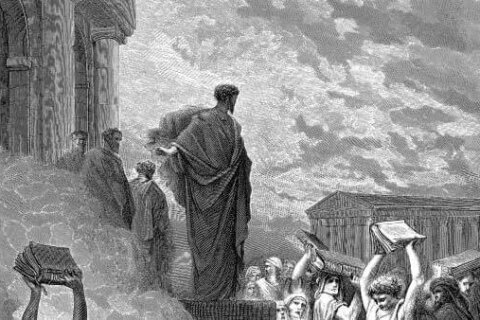“For the bodies of those beasts, whose blood is brought into the sanctuary by the high priest for sin, are burned without the camp. Wherefore Jesus also, that he might sanctify the people with his own blood, suffered without the gate. Let us go forth therefore unto him without the camp, bearing his reproach.”
Hebrews 13:11-13
The animals which were offered up for sin in the Old Testament dispensation were always taken outside the camp and burned. In like manner, Jesus, being the direct fulfilment of those sacrifices, was led outside the gate of Jerusalem. He left the literal city of Jerusalem and was also willing to leave the “camp” of God’s people, get out into the dark world, and bear the reproach of the gospel. Jesus was not merely a good church-goer; He went out and joined the outcasts of society.
During His lifetime, Christ associated Himself with sinners of the worst sort. He ate with publicans at their social gatherings, showed compassion to prostitutes, and consorted with people that other religious folk deemed far too wicked to even be around. People looked on and thought Jesus had lost His mind. They would never connect themselves to such “base” sinners. Jesus spent so much time with sinners that He earned the nickname “Friend of sinners.” He won the hearts of the friendless by becoming friendless Himself. He joined in with humanity, and while never becoming a sinner, He became an outcast with the outcasts.
Moreover, at His death, Jesus was indeed an outcast. When hung on the cross between two notorious criminals, He was viewed in the public eye as being on the same level of criminality and deserving the same punishment; but at the same time, what moved the thief beside Him to repentance was Christ’s willingness to join him in the punishment and reproach for his sin. Jesus was despised, rejected, spat upon, beaten, and murdered in the end. He was more than a martyr, for He did not die to retain His own integrity, but He died for the sins of others.
Had He chosen not to die, He would have remained perfectly just and righteous. Yet, because of His great love and His tender care for the human race, He died as a ransom for all. Although He never joined sinners in their sin, He met them in their state of helplessness and shame.
He was willing to be made subject to the greatest embarrassment of all time. The Great Omnipotent made Himself needy and helpless to be able to meet people at their wit’s end and know how they felt.
Christ Himself was at His wit’s end in Gethsemane when He cried, “Let this cup pass from Me, Father!” Throughout His life and all the way to His death, Christ showed forth a pattern of joining in with the masses of suffering humanity.
Now therefore, we, as His body, must follow Christ “without the camp, bearing His reproach.” We must get outside of our church-houses and join the downtrodden of humanity, to the point that we will be associated with them and thereby looked down on as well. In order for us to reach the world, we must also be willing to be called
“friends of sinners.”
People will know how much we love them by how much we are willing to suffer with them.
When they see the church crucified with Christ, they will believe. The brokenhearted of this world will be made whole as they see our hearts broken for them. The weary and heavy-laden in sin may be saved when we weary ourselves in God’s service and are heavy-laden with His burden of love. Those who are despised in the world will be moved as we are willing to be despised and reproached for Christ’s sake.
When we join Christ without the gate and become outcasts with the outcasts, then will the outcasts come in. Those who are troubled and in distress need a David who will be in trouble with them. Only when we hurt with the hurting multitudes are we qualified to offer them healing. We will never be able to touch the lives of those who cry themselves to sleep if we can never mourn with them in their time of distress. We will never have an answer to all the world’s suffering until we ourselves become “men and women of sorrows” and become familiar with grief.
Our most persuasive and convincing message of love to the world is our willingness to give up our own comforts for the sake of their salvation. Let us then join Christ without the gate.





